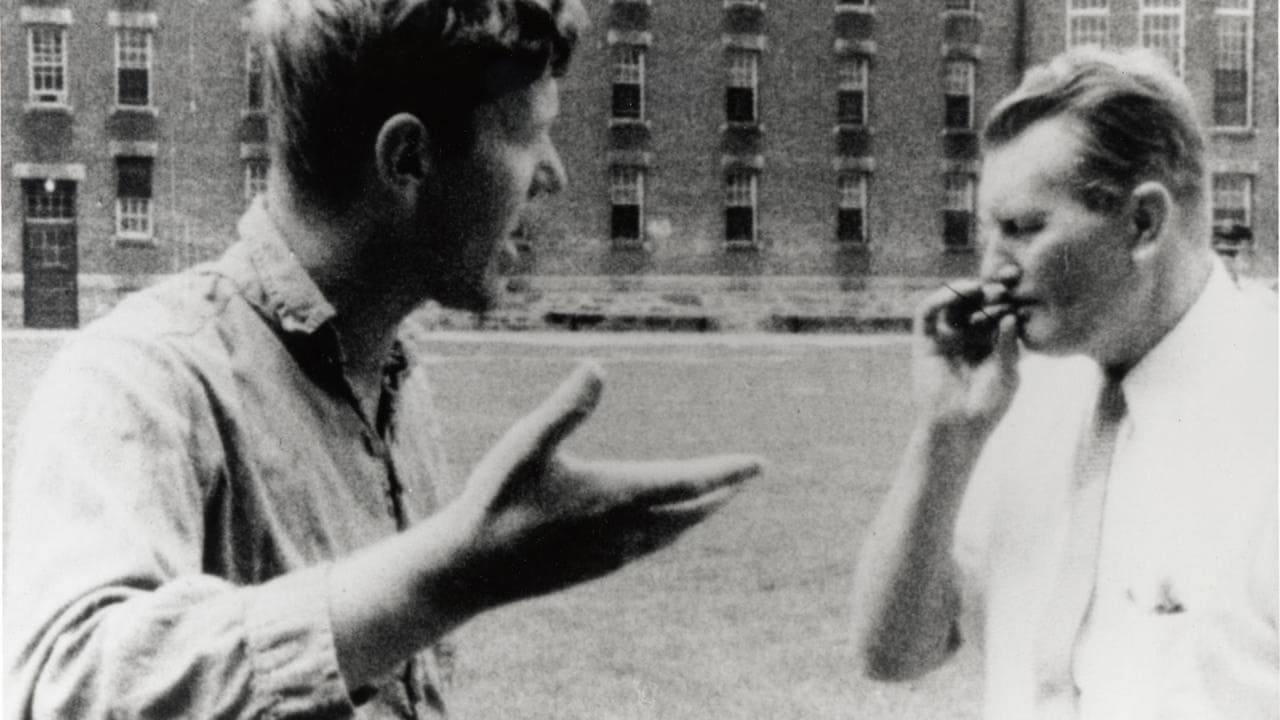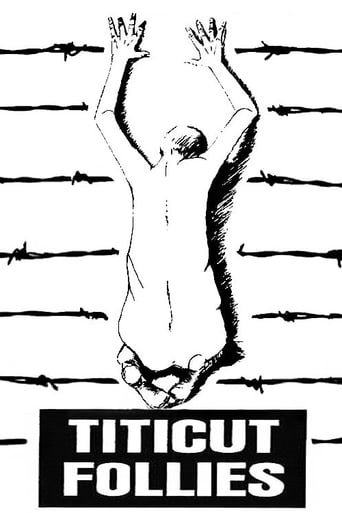



Lack of good storyline.
A Brilliant Conflict
Blending excellent reporting and strong storytelling, this is a disturbing film truly stranger than fiction
View MoreThe thing I enjoyed most about the film is the fact that it doesn't shy away from being a super-sized-cliche;
View MoreIn 1967, documentary filmmaker Frederick Wiseman made his first and most controversial film that uncovered the truth of what goes on behind the close doors of a seemingly typical mental asylum. The film is called Titicut Follies, and has proved itself to be one of the most controversial and enigmatic films of all time. It focuses on one of the touchiest subjects, and makes it so you can't turn away even when you feel you should.Titicut Follies documents life at the Bridgewater State Hospital for the criminally insane. It shows graphic depictions, in black and white, of the horror and wretched tainting of humanity and the dehumanizing of innocent people that took place at the institution. The patients in the asylum are taunted by guards, forced to walk around in the nude because "it is cheaper," and are abused verbally and physically everywhere they turn.The most chilling aspect is when one man, dubbed "the paranoid schizophrenic," claims that he feels worse now than when he checked into Bridgewater State. This leads to the shocking conclusion that maybe the asylum causes mental illness rather than prevents it. There is also a very haunting scene of force-feeding a reluctant patient whose food is then contaminated with cigarette ash from the person who is forcing the tube down his nose. The scene provided me with one of the most stunning and stiffening feelings I've ever seen in a film.Shortly after it was completed, Wiseman was the target of the Massachusetts government who was threatening to ban the film completely from screenings and Television. The government stated that it was a violation of the patients' lives and profit or publicity shouldn't be made at their expense. Wiseman swears that the government was trying to protect a state run institution, and because of the graphic nature and honesty of the documentary the people simply didn't want to give one of their facilities a bad name. I truly believe him. It seems like the typical move for a state government. Hide the truth, protect the wealthy.Being that the film is so rare, how did I stumble upon a copy? Titicut Follies had one and only Television run in 1992 on PBS. The film is available on DVD, but is so rare and expensive coming across a copy is harder than it may seem. My uncle of all people had a copy of the one time it was broadcast on TV. A title card with a strict and emotionless narration about the film's content and an introduction by Charlie Rose preceded the film itself. After the film, a tongue-in-cheek statement about the asylum changing its ways was shown immediately followed by a PBS representative asking the viewer to call the number on screen to donate ten dollars to help the network invest in more documentaries.So what was the film doing for thirty-two years? Wiseman continued to direct many other documentaries after Titicut Follies, where he focused on a variety of subject matters, at the same time try and give his first effort the rightful release it deserved. Finally, in 1991, he did after a Supreme Court ruled it acceptable since many of the patients filmed were deceased, their legal guardians at the time of the film were notified and each one confirmed to the use of the patient in the documentary, and as long as a statement was made that the institution was gradually different.But is it? Currently, what happens behind those Bridgewater doors stays behind those Bridgewater doors. It's an undiscovered mystery. I have a feeling it does possess some essence of normality in the present day. In the sixties, if you were criminally insane you were treated with carelessness. Over the years, I believe people have grew more accepting and tolerate of the unfortunate soles who are simply "not all there." I'm sure now in asylums people are much more patient and understanding with the conditions and trying to help.That's not to say a sheet should be placed over past events. The treatment is nonetheless horrifying to this day, and Titicut Follies is for the people seeking the harsh truth. While it will be neglected by people that don't believe they can handle the subject matter, it truly should be viewed by everyone. It's already sad that the film has had such trouble getting some sort of broad release. This is the kind of film some people need to be forced to watch. Anyone in the medical field should be obligated, and any ordinary human should be aware at the very least.Directed by: Frederick Wiseman.
View MoreTiticut Follies for me is an exploration of the human condition in general, an empathetic approach to both prisoners and staff in a hospital for the criminally insane (asyla have often been used as metaphors for society and it's power structures, since Poe's tale "The System of Doctor Tarr and Professor Fether"). It's also a reforming film, a quiet condemnation of the treatment of the prisoners in a systematic sense. The prisoners are kept naked seemingly for a lot of the time. It's not really clear why this is, and it's humiliating for them (they are covering up their modesty, and so they are aware of loss of dignity). On the other hand I'm sure that however inappropriate, it's done for (doubtlessly foolhardy) reasons of practicality (none of the guards want to look at naked prisoners all day I'm sure).There's bullying of a patient called Jim, an old man, who is asked questions repetitively, and then when he answers the guards pretend not to hear him and ask him to repeat himself. It's the kind of bored casual bullying that even bright well-adjusted emotionally intelligent kids slip into at school, "oh there's the weird up kid, let's push their buttons and see which whistles blow and which bells ring". It's not right, but it's a systematic failure, and typical of human behaviour, rather than the results of calculated actions by a group of twisted sadists.The chief guard appears to have a degree of megalomania, he wants all the applause at the follies and likes to be the centre of attention, and is apparently kind of put off when a nurse is showing a letter of thanks from a patient because he's no longer the centre of attention. I think he would of made a good TV host, but he wound up in a prison, so probably has issues with that.I was worried about voyeurism at one point. A man is force fed because he has refused to eat for three days and is skeletal, he is dead before the end of filming, and there is a match cut of him on the bed in the hospital after feeding to a picture of his corpse. That seems a little irresponsible to me. I don't see any critical context, if a patient has become insensible, surely it's irresponsible to let them die? The force feeding is not pleasant for sure, but it's not insufferable in my opinion. If the man had made clear his wish to die, then that's another matter entirely.One really effective criticism for me is that there is man who clearly doesn't belong in Titicut. He complains a lot to the doctors that the place is causing a problem for him that wasn't already there, and that he just needs to be sent back to the normal prison. He's an articulate individual and I was convinced by him. The panel of doctors he was talking to were pretty much ignoring him. He's telling them that the drugs he's on are reacting badly with him. At the end of the hearing the doctor is recommending his dosage of tranquilisers be upped (that really is insane). The man is capable of a lot of restraint, he's being ignored, and when the doctors interrupt him mid-flow and beckon for him to be taken out of the room he just goes. Me, you, and almost anyone else would have gone ballistic in the same situation. It seems he's been sent there because he complained that the coffee at the prison was being drugged, which apparently is a paranoid delusion, well they have done that at prisons a lot in the past, and I think they still do it today. Even if he's wrong, what the hell is he being sent to a hospital for the criminally insane for just for that? There's a suggestion which isn't fully fleshed out that certain individuals are there for being black and uppity, and some for being communist. It's hard to comment on that further when the film doesn't devote to much time to it, but that's the impression I got.The entertainment that is referred to in the title isn't a point of concern for me. There are a group of songs that the inmates perform. I didn't think there was any manipulation here. Their faces are very unguarded and they are very nervous during the performance, but you can see as soon as they have finished their song the relief and glee, it's probably the only time they'll be happy all year.I'm fond of DW Griffiths' aspiration that film could change the world, and guess what, that's what Wiseman's film did, there were directly-provoked reforms the year after the film was made. To what extent I don't know, but he achieved something there. It's undoubtedly one of the great documentaries.One last word is that people are apparently ignoring the main meaning of the word follies, which would be a plural of folly: "the state or quality of being foolish; lack of understanding or sense." That is what is going on at the institution, government by folly.This film, and pretty much all of Wiseman's films are available directly from Zipporah films on DVD, and are not stocked by Amazon.
View MoreI saw this film while in college back in the 1970's and was amazed and disturbed. I think it was banned or hard to find at that time. My professor was able to get a copy. It is difficult to describe this documentary. It was sad, harshly realistic and horrific. This was how inmates/patients were treated, but again, it was the 1960's. They were likely using the same treatment methods since the 1920's. One interesting note, I met one of the patients who was in the film. He had been released and apparently was doing well enough. I'll not identify him because he was well known in his community. He remembered the filming, but did not know that he was famous for it. He has since passed away, but many people remember him fondly. If there can be a bright side to this film, I guess that's it.
View MorePsychiatry is a dangerous pseudoscience cult that is the most destructive force humanity has ever seen. Governments support this abuse of human beings for power, profit, and degradation. If psychiatry continues and people do not put an end to it, history WILL repeat itself. The suffering and deaths will continue and families will be destroyed. Psychiatry MUST be stopped. It is a CULT.It is time to put an end to this dangerous pseudoscience and the psychiatric criminals who assault, abuse, innocent and vulnerable human beings. Psychiatrists must all be arrested and imprisoned for life for crimes against humanity.
View More